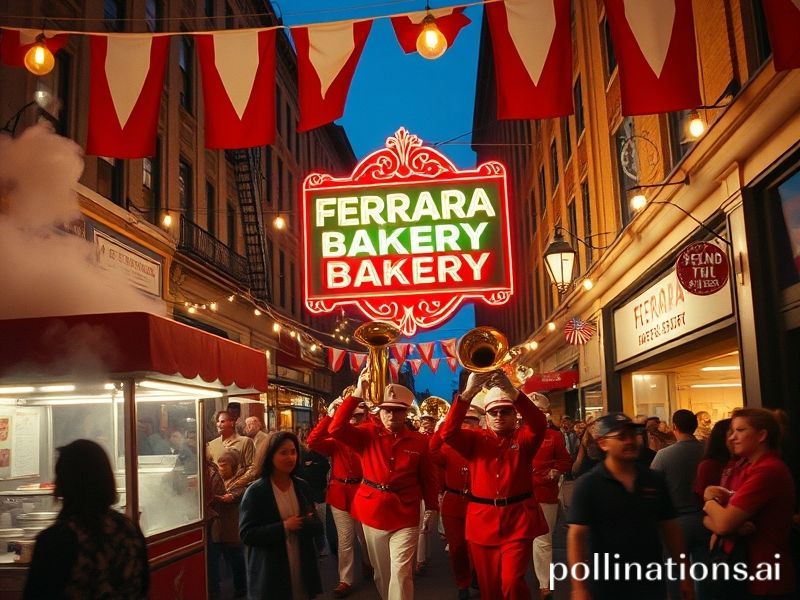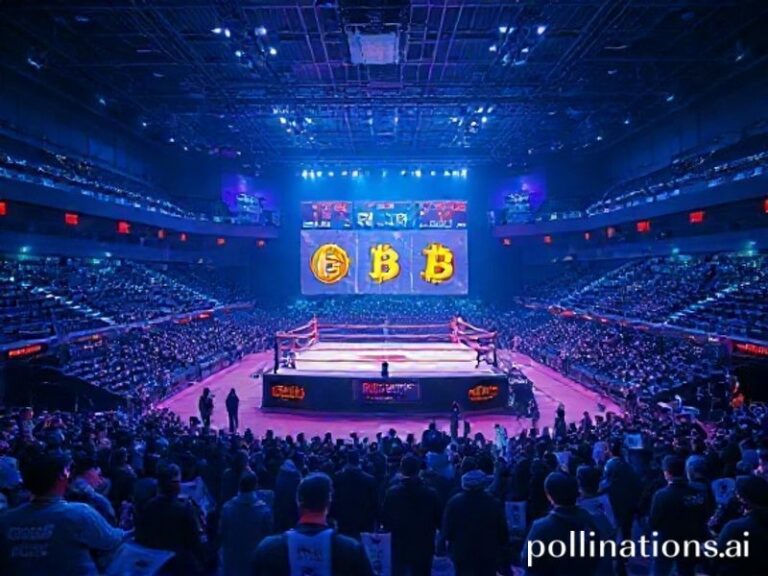San Gennaro: The $7 Globalization Masterclass You Can Eat
San Gennaro in Little Italy: The World’s Cheapest Globalization Masterclass
By Dave’s Locker International Desk
Every September, roughly one million human beings shuffle down Mulberry Street, New York, to celebrate a Neapolitan bishop who died in 305 AD. They are greeted by the scent of deep-fried dough, the clatter of carnival games, and the distant wail of an espresso machine that sounds suspiciously like a dying seagull. This, dear readers, is the Feast of San Gennaro—an 11-day festival that proves, conclusively, that globalization can be reverse-engineered with nothing more than a sausage grinder and a credit-card processing fee.
To the untrained eye, it’s just another street fair. To the geopolitically inclined, it’s a geopolitical Rorschach test. While Davos delegates sip fair-trade kombucha and debate supply-chain resilience, San Gennaro achieves the same result by frying zeppole in palm oil sourced from three continents, served on plates made in China, and paid for with Venmo. One bite and you’ve tasted the global commodity chain—plus powdered sugar.
Look east and you’ll spot a delegation of Milanese fashion interns live-streaming to 400,000 Korean followers who think “Little Italy” is a theme park. Look west and there’s a retired Sicilian nonna haggling over the price of a cannoli with a tourist from Shenzhen who just learned the word “ciao” from TikTok. Somewhere in the middle, a crypto bro in a Fendi hoodie is trying to buy an NFT of the Virgin Mary painted on a pizza box. The transaction fails because the blockchain is congested—probably by someone minting a JPEG of the sausage stand.
San Gennaro is what happens when soft power forgets to bring its wallet. Italy exports €54 billion in agri-food products annually, but nothing travels farther than the cultural meme of a saint whose blood allegedly liquefies in Naples every year. That miracle is reenacted nightly in Little Italy, except the blood is marinara and the liquefaction is performed by teenagers wearing AirPods. UNESCO lists entire Mediterranean diets as intangible heritage; San Gennaro distills it into a $7 paper tray of arancini you’ll drop in a trash can next to a “No Littering $500 Fine” sign—an irony so pure it could be bottled and sold as a limited-ededition limoncello.
The festival’s economic footprint is modest—about $50 million, or what Goldman Sachs calls “a rounding error.” But its diplomatic footprint is outsized. Every year, the mayor of Naples sends a vial of San Gennaro’s blood by Alitalia cargo, accompanied by a priest whose frequent-flyer miles are underwritten by the Campania region. In return, New York’s mayor shows up, eats a sausage, and pronounces it “molto autentico,” thereby reaffirming the transatlantic alliance more effectively than any NATO summit. The priest blesses the sausage. The mayor blesses the priest. The photographers bless the optics. Somewhere in Brussels, a bureaucrat drafts a 400-page report on cultural diplomacy and wonders why no one invited the sausage.
Meanwhile, back on planet Earth, inflation stalks the mozzarella. The price of imported provolone has jumped 18% thanks to the war-induced diesel surcharge on every eighteen-wheeler between Salerno and the Holland Tunnel. Vendors compensate by shaving 3 mm off each slice, a micro-austerity so subtle that economists will spend years arguing whether it counts as shrinkflation or performance art. The consumer, naturally, is too busy Instagramming the cheese pull to notice.
And yet, against all odds, San Gennaro persists—part street opera, part open-air museum, part cholesterol endurance test. It is proof that human beings will cross oceans, endure TSA pat-downs, and pay surge-pricing for an Uber just to stand in a line that smells like lard and nostalgia. In a world fracturing into algorithmic echo chambers, the festival offers a rare consensus: deep-fried dough is good, overpriced beer is inevitable, and somewhere a saint is still counting the receipts.
So raise a plastic cup of lukewarm Peroni to San Gennaro, patron saint of receipts and questionable life choices. He may not stop Vesuvius from erupting, but he’s damn good at getting the world to wait in line for a meatball. And in 2024, that’s as close to international cooperation as it gets.







